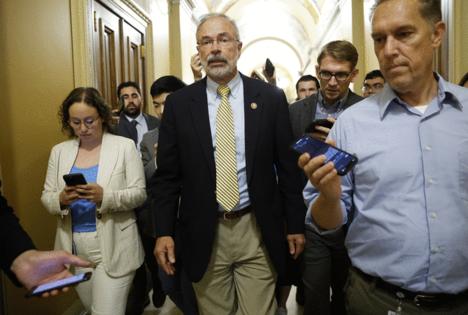Congress, Trump diverge on how to avert a government shutdown
Published in Political News
WASHINGTON — The outlines of a potential government funding solution is taking shape.
Congressional leaders are discussing a plan that would avert a government shutdown by extending federal funding, allowing more time for them to reach a more comprehensive agreement that would include updated funding levels for federal agencies.
The tentative plan would tie three Senate-passed spending bills to a short-term extension, known as a continuing resolution, that would fund the federal government at current spending levels.
Congress must pass a funding extension before the end of September to keep the federal government funded. But the path to agreeing on an extension has been marked by drastic proposed cuts to federal agencies, public frustration from lawmakers, and partisan claw-backs that Democrats say undermined the funding process.
Conversations are ongoing among congressional leaders — with the White House weighing in — on how long the stopgap should last. But they’re in the early stages. So far, there’s limited agreement on provisions key to any potential deal. Although both wings of Maryland’s delegation are open to supporting a funding extension, the current discussion may not meet their expectations.
Eastern Shore Rep. Andy Harris, an appropriator and the chairman of the conservative House Freedom Caucus, told The Sun he’d be open to a short extension or a long-term compromise.
“I’d support a short-term one, but I don’t know; end of November might be too long,” Harris told The Sun. “I’d definitely support it into next year. But if we have to do a very short term in order to negotiate a few of the bills, that’s alright with me.”
“If not, it should go into next year,” Harris added.
The current conversation tips outside those parameters.
Leaders of the House and Senate Appropriations Committees prefer a two- to three-month extension. That would set up a potential deadline prior to Thanksgiving or Christmas, depending on when the leaders agreed to set an expiration date.
“My personal preference is for us to get agreement on the three bills that were passed, and attach it to a short-term CR,” Sen. Susan Collins, R-ME, chairwoman of the Senate Appropriations Committee, told reporters on Tuesday. “But ultimately that’s going to be a decision made by the leaders.”
“A date in November would be my preference,” Collins said. “But obviously, it’s not my call.”
The White House wants a longer extension. It sent guidance to Congress on Tuesday that requested a Jan. 31 deadline. The guidance also included changes the White House wants Congress to make to the funding of some programs, according to Collins.
Some believe the White House’s deadline was flexible — “It’s more of a suggestion than anything else,” Rep. Tom Cole, R-OK, chairman of the House Appropriations Committee, told reporters on Tuesday. But even if it is, what Harris says he will vote for diverges from what appropriation leaders and the Trump administration are proposing.
“I’ll support a short term that goes maybe into October,” Harris said. “We’re going to find out pretty soon whether or not the Senate is going to engage in serious deliberations with us. And if they’re not, then we should just go ahead and just look at a year-long CR.”
“Not even year-long, but into December of 2026,” Harris added. “Just move it past the election.”
Meanwhile, the delegation’s Democrats have said Republicans need to concede on certain issues, like protection against future rescissions, if they are to support any deal. Details of the negotiations are foggy, but it’s unlikely that Republican leadership would agree to concessions that further distances their own members support. Harris has been an advocate for additional rescission packages.
“If there is a shutdown, it will be squarely at the feet of the Republican majority,” Rep. Johnny Olszewski of Baltimore County said last week. “We should be open to anything that actually is a bipartisan agreement that isn’t going to be undone by a set of rescissions.”
Without the guarantee, Olszewski would be concerned that the Trump administration could target federal funds for the construction of the new Francis Scott Key Bridge.
Federal funding expires on Sept. 30.
--------------------
©2025 The Baltimore Sun. Visit at baltimoresun.com. Distributed by Tribune Content Agency, LLC.
























































Comments